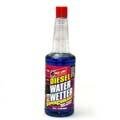Cooling Tutorial
Years ago environmental required cleaner burning engines and thus engine operating temperatures were raised in order to reduce exhaust emissions. Today's engines run on the borderline of overheating.
We have found that many people neglect their cooling systems until it becomes a costly problem. A properly maintained cooling system will provide excellent service for many years. There is more to maintenance than just changing the antifreeze every two years. Little things like replacing hoses and keeping the air flow clean and unobstructed are also very important.
The cooling system is just that; a system. We are not just talking about a radiator; but a water pump, hoses, fan, heater, thermostat, engine block, and head(s). The antifreeze we put in our cooling system contains a minimal amount of protection against rust, scale, and forms of corrosion. Cooling system efficiency requires cleanliness. Antifreeze typically has little cleaning effect. People use tap water (which usually contains minerals) to add to antifreeze. These minerals can quickly overcome the additive package in antifreeze. The additive package in antifreeze is consumed whether you drive or not.
The protection from freezing and additional boil-over protection remains the same even when the additives are used up. A simple check for freeze or boil-over protection will tell you nothing about the rust, scale, corrosion, lubrication factor, electrolysis, cavitation, erosion, and pitting that is going on in your system.
Cooling System Facts
- A national survey found 7 out of 10 vehicles contain rust and scale
- Over 60% of water pump failure can be attributed to seal failure.
- Over 50% of engine failures can be attributed to cooling system failure.
- Just 1/16th of an inch of deposits on 1 inch of cast iron is equivalent to 3-1/2 inches of cast iron, reducing heat dissipation by 40%.
If you are overdue for cooling system maintenance, the deposits have begun to build up. If you had a radiator rodded out because of deposits, the engine block and head(s) are in the same condition. Hot spots in the block and head(s) cause engine detonation (ping) and can shorten lubricant life.
Do you think a 30-minute fast flush will remove what it took years and tens of thousand of miles to build up? NO WAY! Plus, most fast flushes contain acids, which do cause damage to copper, aluminum, brass, and zinc alloys. There are a few antifreeze products that protect against this buildup, one we highly recommend is DexCool
 Water transfers heat better than antifreeze/coolant. The word coolant is used as a sales tool to sell more antifreeze in the summer. The one product that we have found to actually provide extra cooling capability is Redline Watter Wetter. What this does is reduce the surface tension of the water in your cooling system, allowing for a more efficient transfer of heat from engine block, to the coolant, and then to the radiator where it is cooled. Antifreeze does increase the boiling temperature only slightly. It is better to use 40% antifreeze and 60% mineral free water; this will give you better heat transfer. To exceed 60% antifreeze can cause overheating.
Water transfers heat better than antifreeze/coolant. The word coolant is used as a sales tool to sell more antifreeze in the summer. The one product that we have found to actually provide extra cooling capability is Redline Watter Wetter. What this does is reduce the surface tension of the water in your cooling system, allowing for a more efficient transfer of heat from engine block, to the coolant, and then to the radiator where it is cooled. Antifreeze does increase the boiling temperature only slightly. It is better to use 40% antifreeze and 60% mineral free water; this will give you better heat transfer. To exceed 60% antifreeze can cause overheating.


